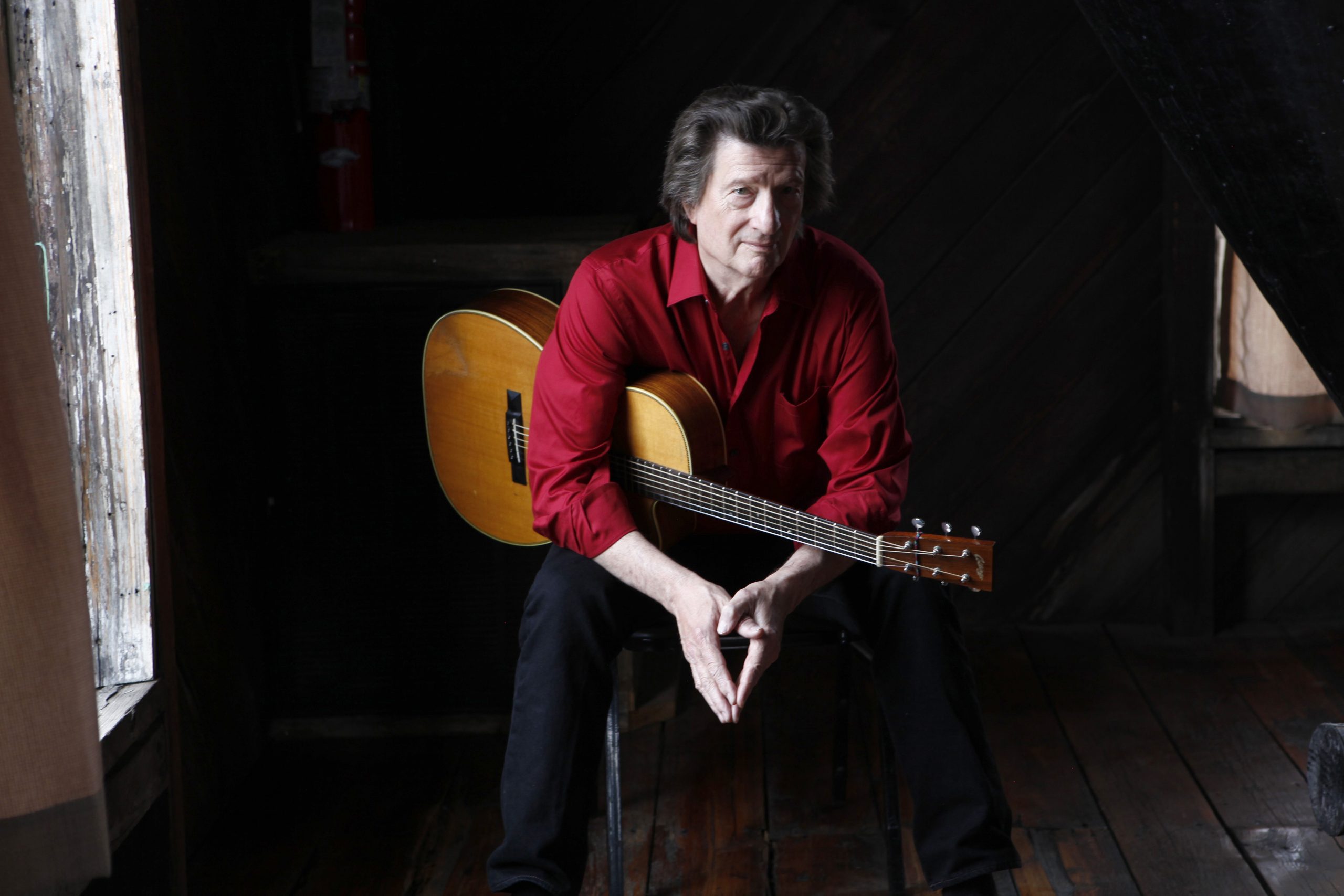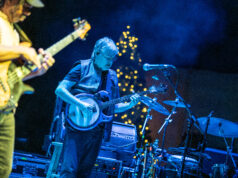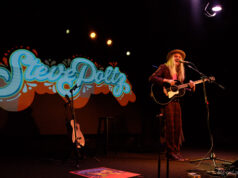 Chris Smither (Photo by Jeff Fasano)
Chris Smither (Photo by Jeff Fasano)
On the 2014 album A Link of Chain: A Songwriters’ Tribute To Chris Smither, a number of artists who have been influenced by Chris’s music cover his songs. Among them was folk-blues enchantress Eilen Jewell. It only made sense for the two of them to appear together on a double bill at The Hamilton Live recently, giving the audience a wonderfully intimate evening of songs and stories.
Smither performed first on May 15, taking the stage alone, with his just acoustic guitar. Before he began his set with “Open Up,” he said it was good to be with “real people,” though, after the long layoff from touring, he’s not quite used to it yet. He followed that with “Make Room For Me,” then told the audience, “One of these days, I’m going to make a record called ‘Songs My Mother Would’ve Hated.'” “Don’t Call Me Stranger,” he said, “is going to be the first track.”
The story continued after the song, as Chris said, “If I played a song like that, she’d have sighed. She’d say, ‘Can’t you play a love song?'” He’d reply, “Mama, that was a love song.” “Time Stands Still,” he explained, is “the kind [of love song] she liked.”
Moving along, Chris told the audience, “This is the most frequent question I get: How do I write?” What he said next was very interesting, as some of the language was exactly the same as was used by speculative fiction author Kathe Koja in an event on her online book tour (for her new novel, Dark Factory) I attended the next evening. He emphasized, “There’s an element of mystery.” Chris went on to explain that writers don’t really know how they get ideas and inspiration, but they know how to “set out the bait” to catch it. “Down To The Sound,” from his 2018 album Call Me Lucky, explicitly addresses these issues.
Watch Chris Smither play “Down To The Sound” Live from Norfolk Street in 2021 via YouTube:
“Lola,” he said, is “another one of the those mama songs. She would really have hated this one.” After the song, he recalled doing a gig in a Massachusetts prison (he’s been based up there for several decades), and he admitted to being scared about going inside. He played this song to the men there and, when he finished, one of the prisoners exclaimed, “I know that bitch!”
I can certainly understand how, given the circumstances, that could have been a rather unsettling thing to hear, but it’s also a compliment. As a writer, you want what you create to connect to people, for them to see themselves and their experiences in your work. So, while it is a bit rattling to be in that situation in a prison, it’s also a mark of success as an artist that you’re able to get through to people with very different experiences from your own.
The set continued with “Hundred Dollar Valentine.” Chris explained some of his process with regard to the next tune, “What It Might Have Been.” He spoke about picking up the guitar and playing what he called a “hackneyed blues guitar intro,” the kind of thing that is familiar and has been done many times. After playing for a bit, he went on, you start to wail about how miserable you are. Chris suggested that, if this doesn’t really work out, you “weren’t brought up right.”
Following “Train Home,” he introduced “The Origin of the Species, With Thanks To Charles Darwin,” a song that starts with the Bible and the Garden” and goes on to describe the course of humanity right up through Charles Darwin and Watson & Crick’s discovery of the double helix. “It takes,” as he said, “about 3 minutes.”
To make his latest album, the career retrospective More From The Levee (released in 2020), Chris went back down to New Orleans, where he grew up, for about three weeks. People often ask him, “How did growing up in New Orleans affect your music?” (I am not innocent of this; I interviewed Chris a few years ago, and I definitely brought this up.) “The short answer,” he explained “is ‘I don’t know.'” He continued, “You grow up where you grow up.”
Stream More From The Levee by Chris Smither on Spotify:
I want to stop and consider this point a little more. Unless you grow up in a city like New York or DC, which has good, accessible mass transit, your world, when you’re growing up, is pretty limited. You go the places your parents can take you in their car. If you’re in a city, things may be somewhat walkable, but you’re still limited to a fairly constrained bit of real estate. There’s only so far little legs can take you, even on a bike. You’re affected by the culture of the place you grow up, but you’re not exposed to it in the way you are as an adult who can get out and navigate the world on their own.
To get back to More From Levee, the experience of making the album was, for Chris, relatively easy, because it was a matter of re-recording existing songs. However, as the project moved forward, his producer came to him and insisted he write a new song for the album. That song was “What I Do.”
Though Chris may not be able to isolate how growing up in New Orleans affected his music, the city and its characters do appear in songs like “No Love Today.” The chorus of the song was based on the singing of the fruit and vegetable vendor who used to come down the street when he was a child. It really immerses you in that city, in an earlier day.
Chris finished his set, appropriately, with “Leave The Light On.” He had held the audience at rapt attention throughout his set, and was generously rewarded with a standing ovation. I will add that my date, who was not familiar with his music before Sunday evening, was really taken with his wit and skill.
Watch Chris Smither perform “Leave the Light On” Live from Norfolk Street on YouTube:
After intermission, Eilen Jewell took the stage with her band. It made sense for her to come on second, as she had a full band with electric instruments. She opened her set with three tracks from her most recent album, 2019’s Gypsy: “Hard Times,” “Crawl,” and “Miles To Go.” Before that last one, she said how much she loves playing the Hamilton, and mentioned that her daughter, who is now 8 years old, took her first steps here.
Having played a number of cuts from that latest album, Eilen and her band played “Rich Man’s World,” turning back the clock for “one of our oldest tunes.” Eilen threw a couple a couple of covers into the set next, singer-songwriter Eric Andersen’s “Dusty Boxcar Wall,” which she said is one of her favorite songs, and soul singer Irma Thomas’s “Breakaway.”
In a bit of banter between songs, Eilen said she wanted to try out some new material on the audience, as they are headed into the studio next month. She asked if we’d be honest with her, and I volunteered, “I’d never lie to you!” She seemed genuinely touched, and said, “Just for that, I’m going to play you one of my most depressing songs,” and, with that, they went into “Rain Roll In.”
Watch Eileen Jewell perform “Rain Roll In” live for Signature Sounds on YouTube:
To call one of her songs “most depressing” is something of a statement for Eilen. As she admitted in the lead-up to the next one, she tends to hit those downbeat moods pretty often. She has winked at this by calling one of her records Queen of the Minor Key. “High-Shelf Booze” is “the closest I have to a happy song. It’s actually a revenge/drinking song.”
After “High-Shelf Booze,” Eilen made good on her promise to show us some new material with “Crooked River,” which is going to be on the new album. After the jazz-influenced “Santa Fe,” she went in a more country direction. Eilen’s music has been characterized as Americana, which is fair, as there elements in it of folk, blues, jazz, and classic country music. With Butcher Holler, she dedicated a whole record to covering the songs of Loretta Lynn, including “Fist City.” She’s also been influenced by Pinto Bennett, a fellow native of her home state of Idaho, whose work was also in the classic country vein. His “If You Cared Enough to Lie” was the only cover song she recorded on Gypsy.
Rounding out the set, she played another new song, which I didn’t quite get the name of, but I can tell you it’s really something to look forward to on her new album. My date really got a kick out of a line “I got nineteen men” in the last song in the main set, “If You Catch Me Stealing.” For their encore, Eilen and her band played “Mess Around,” which is influenced by a song by the pre-WWII group The Memphis Jug Band.
I really enjoy getting to see how music — the tower of song, if you will — is built and added on to over time. The pairing of Chris Smither and Eilen Jewell was, in addition to two great artists giving first-rate performances, a chance to see, live and in person, how various strains of music have flowed through the late 20th and early 21st centuries.





